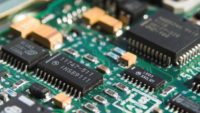U.S. Aims to Slow China Tech Progress with Chip Restrictions
October 17, 2022
The Biden administration is acting to limit China’s rapid military progress by banning shipments of advanced chips and the production tools needed to make them. This is in response to signs that China is using AI and supercomputing to develop hypersonic weapons and systems that may be able to crack highly encrypted messaging. The new rules, which extend to foreign companies using relevant U.S. technology, have already begun taking effect. But companies including Intel, Samsung, TSMC and SK Hynix have reportedly received limited exemptions allowing them to continue shipping to some factories there.
In a speech last week, national security adviser Jake Sullivan characterized the strategy as a “small yard, high fence” approach for critical technologies. The U.S. decided to act unilaterally against China after months of discussions with allies, who were urged to participate in the plan but declined out of concern about damaging economic relations with the People’s Republic, one of the largest technology markets in the world.

The pivot point came in July, with reports that Chinese foundry company SMIC “had cleared a major technological hurdle, producing a semiconductor that rivaled some complex chips made in Taiwan,” according to The New York Times, which said “the achievement prompted an explosion of dissatisfaction in the White House and on Capitol Hill with U.S. efforts to restrain China’s technological advancement.”
By August, White House officials were contacting equipment manufacturers and chipmakers advising them of the new strategy to bar the sale of certain high-tech products to China.
“In weaponizing its dominant choke-point positions in the global semiconductor value chain, the United States is exercising technological and geopolitical power on an incredible scale,” NYT reports that former Defense Department official Gregory C. Allen wrote in a paper for the Center for Strategic and International Studies.
Reporting on the exemptions, The Wall Street Journal writes that the Commerce Department will “review applications for certain exports to U.S. and U.S.-allied facilities operating in China on a case-by-case basis,” while “Chinese-owned facilities, in contrast, would face a presumption of denial.”
The new rules are creating challenges for global allies. While NYT reports that Netherlands-based semiconductor tool manufacturer ASML “rebuffed” U.S. entreaties to join the tech embargo, CNBC writes that the company has “told U.S. employees to stop servicing Chinese customers.”
Chinese officials are calling the U.S. restrictions “a significant step aimed at sabotaging their country’s development,” according to NYT, which says “the move could have broad implications — for example, limiting advances in artificial intelligence that propel autonomous driving, video recommendation algorithms and gene sequencing, as well as quashing China’s chip-making industry.”
Under the Trump administration, the U.S. greatly expanded its list of companies that couldn’t buy sensitive products without a special license, but experts say compliance was specified in a way that made the rules easy to evade, as “previously sanctioned Chinese companies, including Huawei, have tried to gain access to restricted technology through front companies,” NYT writes.
Meanwhile, Huawei, ZTE and other Chinese firms face additional restrictions, as the FCC readies for a vote to ban all new sales of their telecommunications devices in the U.S. Axios writes such a move would mark “the first time the FCC has banned electronics equipment on national security grounds,” and says the proposed FCC order “will also determine the scope of a ban on sales of video surveillance equipment used for public safety.”
Related:
American Executives in Limbo at Chinese Chip Companies After U.S. Ban, The Wall Street Journal, 10/16/22
Apple Freezes Plan to Buy Memory Chips from China’s YMTC After U.S. Imposes Export Controls, MacRumors, 10/17/22
The Chip War with China Is Just Getting Started, Forbes, 10/17/22

No Comments Yet
You can be the first to comment!
Sorry, comments for this entry are closed at this time.